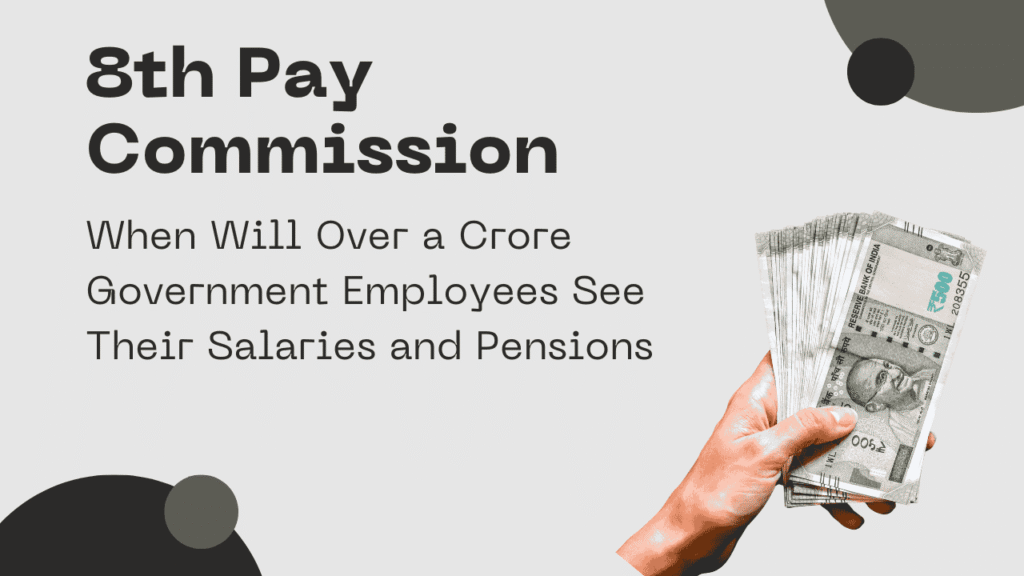Summary: The much-awaited 8th Pay Commission, approved by the Union Cabinet, is set to significantly revise salaries and pensions for over a crore central government employees and retirees. While recommendations are anticipated by late 2025 with an effective date of January 2026, actual implementation is likely in FY27, promising a substantial 30-34% hike. This will involve the crucial fitment factor and an estimated additional cost of ₹1.8 lakh crore to the government.
Highlights:
- 8th Pay Commission to impact over 1 crore central government employees and pensioners.
- Recommendations expected by end of 2025, with implementation likely in FY27.
- Anticipated salary and pension hike of 30-34%.
- The ‘fitment factor’ will be key in determining revised salaries and pensions.

8th Pay Commission: When will govt employees and pensioners receive the hike?
The air is thick with anticipation among over a crore central government employees and pensioners as they eagerly await the implementation of the 8th Pay Commission. The Union Cabinet’s nod to form this crucial commission earlier this year has set the stage for a significant revision in salaries and pensions, aiming to provide much-needed relief and a substantial boost to the financial well-being of government staff and retirees.
Summary of Key Aspects of the 8th Pay Commission
| Aspect | Details |
| Approval Status | Union Cabinet has approved the constitution of the Commission. |
| Recommendations Due By | End of 2025 |
| Effective From (Scheduled) | January 2026 |
| Implementation Likely In | FY27 (April 2026 – March 2027) |
| Expected Hike | 30-34% in salaries and pensions |
| Estimated Cost | ₹1.8 lakh crore (additional) |
| Key Multiplier | Fitment Factor (considers inflation, employee needs, government capacity) |
| Beneficiaries | Approx. 44 lakh central government employees + 68 lakh pensioners = Over 1 crore direct beneficiaries across various ministries, departments, and armed forces. |
While the approval for the commission’s constitution is a major step, the exact timeline for its official announcement and the submission of its recommendations remains a key point of discussion. According to a report by Ambit Institutional Equities, the recommendations of the 8th Pay Commission are projected to be submitted by the end of 2025.
Following this, it is tentatively scheduled to come into effect from January 2026 onwards. However, the real rollout will hinge on the comprehensive report’s completion, its formal submission to the government, and the subsequent approval of its recommendations.
The Road to Implementation: What to Expect
The actual implementation of the 8th Pay Commission is expected to materialize in Fiscal Year 2027 (FY27). This implies that while the commission might submit its findings by late 2025, the revised salaries and pensions are likely to begin reflecting in bank accounts sometime between April 2026 and March 2027. This timeline aligns with historical patterns where previous Pay Commissions have typically taken 18-24 months from their constitution to actual rollout.
The most exciting news for beneficiaries is the anticipated scale of the hike. The Ambit report suggests that the 8th Pay Commission is poised to significantly increase government salaries and pensions by an impressive 30-34%. This substantial increase aims to keep pace with evolving economic conditions and the needs of employees and pensioners.
Cost to the Exchequer and the Role of the Fitment Factor
Such a considerable hike, while beneficial for employees, naturally comes with a significant cost to the government. The estimated 30-34% increase in salaries and pensions is projected to add an additional burden of approximately ₹1.8 lakh crore to the government exchequer. This substantial financial implication underscores the careful consideration and planning required for its successful implementation.
A pivotal element in the revision process is the fitment factor. This essential multiplier plays a crucial role in adjusting salaries, pensions, and various allowances. The fitment factor is designed to determine the revised basic pay by multiplying the existing basic pay, taking into account several factors such as inflation, the evolving requirements of employees, and the overall financial capacity of the government.
The 7th Pay Commission, for instance, used a fitment factor of 2.57, which effectively raised the minimum basic salary. The upcoming 8th Pay Commission will similarly utilize this critical tool to ensure a fair and comprehensive revision.
Who Stands to Benefit?
The impact of the 8th Pay Commission will be widespread and directly benefit a massive segment of the Indian workforce and its retired community. Approximately 44 lakh central government employees, spanning various ministries and departments, are direct beneficiaries. In addition, around 68 lakh pensioners will also see their pensions revised, bringing the total number of direct beneficiaries to more than a crore individuals.
These 4.4 million central government employees and armed forces personnel represent a significant portion of India’s formal sector, accounting for nearly 9% of it, and 0.7% of the nation’s 60 crore labour force. The ripple effect of this substantial salary and pension revision is expected to stimulate consumer spending and have a positive impact on various sectors of the economy.
- Concrete Mix Design calculator as per IS 10262 : 2019
- ITR Filing Last Date 2025: New Deadlines Announced!
- AP EAMCET Seat Allotment 2025: Your College Awaits!
Also read :
- Concrete Mix Design calculator as per IS 10262 : 2019
- ITR Filing Last Date 2025: New Deadlines Announced!

- AP EAMCET Seat Allotment 2025: Your College Awaits!

- UGC NET CUTOFF MARKS 2025 : SUBJECT / CATEGORY WISE CUTOFF MARKS

- Age 62 vs. 70: The Social Security Quick Calculator Reveals Your Perfect Retirement Sweet Spot!

Disclaimer : We gather our information from official websites and aim for accuracy and timeliness. However, some details may need further clarification or updates. Please contact us via our Contact Page with any questions or feedback, as your input helps us maintain accuracy. For the latest information, always refer to official sources.
Thank you for your understanding.
Team GPK News








